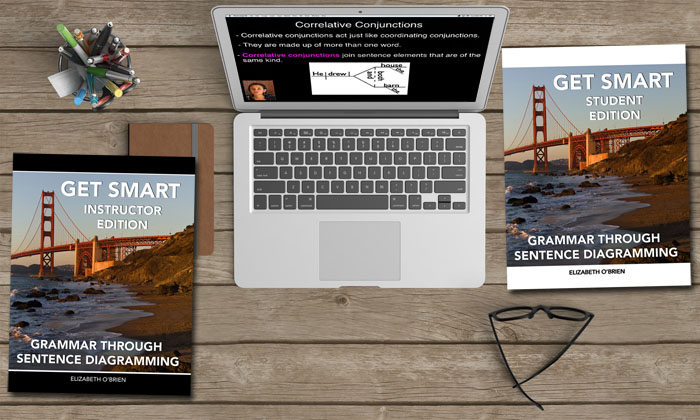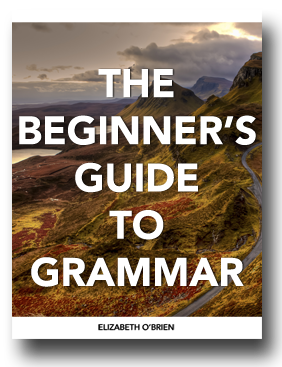Download your free grammar guide here.
What is an infinitive?
What is an infinitive?
When people talk about infinitives, they can be referring to two things:
- The basic form of a verb, without any inflection or tense
- A type of verbal, something that's formed from a verb but doesn't function as a verb
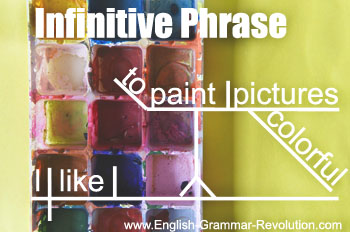
Here in this lesson, we're covering infinitive verbals (#2 above), and I'll just be referring to them as infinitives from here on out.
Words that are formed from verbs but don't act as verbs are called verbals. There are two other types of verbals: gerunds and participles.
Warning: Before we get to the lesson, I just want to note that these guys can get pretty complicated. If you're just learning grammar and you're still feeling shaky about terms like the parts of speech or prepositional phrases, then you might want to pause learning about them and come back here after you have more of a solid understanding of the basics.
Okay...are you still here? Let's get started!
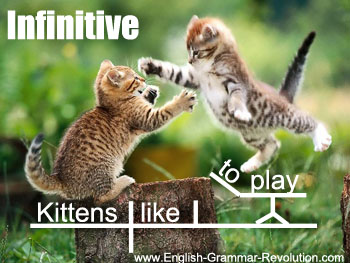
Kittens like to play.
To play is functioning as a noun.
What are infinitives?
Infinitives are formed from verbs, but they function as nouns, adjectives, or adverbs, and they're actually made up of two words: to + verb. These two words (to + verb) come together to act as as a single noun, adjective, or adverb.
Let's look at some examples along with sentence diagrams.
Noun: I want to win.
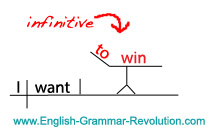
In this sentence, the infinitive to win is a noun. It's the direct object of the verb want.
We diagram the to of the infinitive on a slanted line and the verb on a horizontal line after it. Then, we use stilts to attach this structure to the slot in the sentence that corresponds to the job the infinitive is performing (noun, adjective, or adverb). In this diagram, it's in the direct object slot.
Adjective: The person to call is Lori.
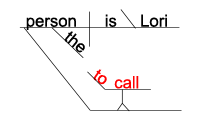
In this sentence, the infinitive to call is an adjective. It's modifying the noun person. Notice that we diagram it from a line branching off the noun person.
Adverb: They run to stay fit.
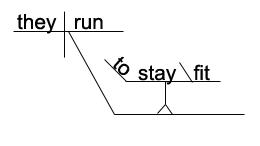
In this sentence, the infinitive is an adverb. It's modifying the verb run. Notice that we diagram it from a line branching off the verb run.
What are infinitive phrases?
A phrase is a group of words that comes together to perform a single grammatical function. Phrases don't contain both a subject and verb. (This differentiates them from dependent clauses.)
Infinitive phrases are made up an infinitive along with the words that modify or complement it. Are you wondering what that means? Let's take a closer look!
Modifiers
Adjectives and adverbs are modifiers—they help describe other words. Infinitives can be modified by adjectives or adverbs. Note that adjectives or adverbs can be single words (green hat) or phrases (hat with green feathers).
Let's look at an infinitive phrase that contains a modifier.
I love to swim in lakes.
- The whole phrase to swim in lakes is acting as a noun (it's the direct object of love).
- To swim is the infinitive, and in lakes is an adverbial prepositional phrase modifying to swim.
I know that this is a lot of information to take in, but I need to point out that something strange is happening here: To swim, a noun, is being modified by the adverbial prepositional phrase. It is telling us where you like to swim.
This means that an adverb (in lakes) is modifying a noun (to swim)! This is strange because adverbs modify verbs, adjectives, and other adverbs—not nouns. Nouns are supposed to be modified by adjectives.
What's going on here?
Well, infinitives are tricky. Since they are formed from verbs, they maintain some attributes of verbs even though they act as nouns, adjectives, and adverbs.
Even if an infinitive is acting as a noun, its "verbness" allows it to take adverbial modifiers just like other verbs. (But it can also take adjectival modifiers just like other nouns.)
This "verbness" quality of theirs allows something else that's kind of strange...
Complements
They can even take complements (like direct objects, predicate nouns, and predicate adjectives), just like verbs can!
Edward loves to run marathons.
- The infinitive phrase to run marathons is acting as a noun. It's the direct object of the verb loves.
- To run is the infinitive, and marathons is the direct object of the infinitive!
| Edward loves to run marathons. | Direct Object | Marathons is the direct object of run. |
| Esme used the binoculars to see her favorite band. | Adverb | Band is the direct object of see, and her and favorite are adjectives modifying band. |
Prepositional Phrase or Infinitive?
Most of us are used to the word to being a preposition, but that's not what it is when it's a part of an infinitive. When it's being used as part of an infinitive, we call it an infinitive marker.
Look at these two phrases and see if you can figure out which one is a prepositional phrase and which one is an infinitive.
I want to swim.
I went to school.
Which is which? How can you tell the difference? Well, infinitives are formed from to + a verb, and prepositional phrases will have to followed by a noun. So, the question that you have to ask yourself is whether the word after to is a verb or a noun.
If it's a verb (swim), then you're looking at an infinitive (to swim). If it's a noun (school), then you're looking at a prepositional phrase (to school).
I want to swim. (infinitive)
I went to school. (prepositional phrase)
Where's the to? What are bare infinitives?
Sometimes, identifying infinitives can be quite tricky because the word to is omitted. It's implied, but it's not stated. When this happens, we call them bare infinitives.
They usually occur after certain verbs like feel, hear, help, let, make, see, and watch.
Here are some examples. I'll underline put the special verbs in bold so that you can see where they are. The bare infinitives are underlined.
They watched the ship sail.
The special verb here is watched, and the verb sail is a bare infinitive. It's as if the sentence says I watched the ship (to) sail.
I heard the doorbell ring.
The special verb here is heard, and the verb ring is a bare infinitive. It's as if the sentence says I heard the doorbell (to) ring.
Let it go.
The special verb here is let, and the verb go is a bare infinitive. It's as if the sentence says Let it (to) go.
Diagramming Bare Infinitives
There are a couple of ways to diagram these, and we'll look at two here.
Sentence Diagram #1
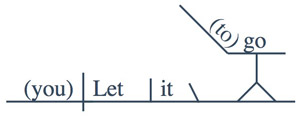
In this version, it is treated as the direct object of let, and the bare infinitive (to) go is treated as an objective complement.
Sentence Diagram #2
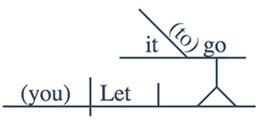
In this version, it is treated as the "subject" of the bare infinitive (to) go. All three words, it (to) go, are treated as an infinitive phrase acting as the direct object of let.
What are split infinitives?
As you know, infinitives are made of the words to + verb.
To go where no one has gone before
When you place a modifier between the to and the verb, you "split" the infinitive.
To boldly go where no one has gone before
To boldly go is a split infinitive because it contains a modifier (boldly) between the to and the verb.
Some style guides recommend against using split infinitives, but they're widely accepted in modern English usage. In most cases, you're okay using them.
Summary
Let's review what we covered in this lesson!
- Infinitives are formed from verbs (to + verb), but function as nouns, adjectives, and adverbs.
- Infinitive phrases consist of an infinitive and its modifiers and complements.
- Infinitives maintain some of their "verbness" and can be modified by adverbs and can take complements.
- To + noun creates a prepositional phrase. To + verb creates an infinitive.
- Bare infinitives are infinitives that don't have the to stated.
- Split infinitives contain a modifier between the to and the verb.
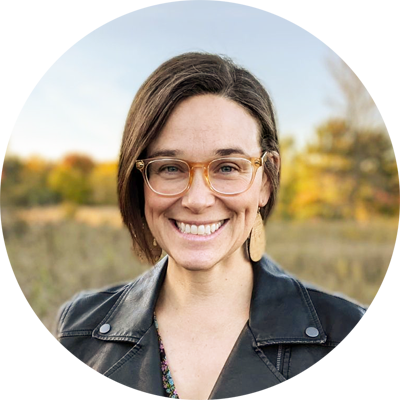
Hello! I'm Elizabeth O'Brien, and my goal is to get you jazzed about grammar.
Your website is awesome. It helped me get through my grammar class and earn my associate degree at age 51!!!
- Lynette
If you'd like to teach or learn grammar the easy way—with sentence diagrams—check out our Get Smart Grammar Program.
It starts from the very beginning and teaches you grammar and sentence diagramming in easy, bite-size lessons.
This is original content from https://www.english-grammar-revolution.com/infinitive.html
Our Free Guide Gives You A Fun Way
To Teach And Learn The Basics v

Elizabeth O'Brien is the creator of Grammar Revolution.
Her lessons are guaranteed to give you more confidence in your communication skills and make you smile. :)
